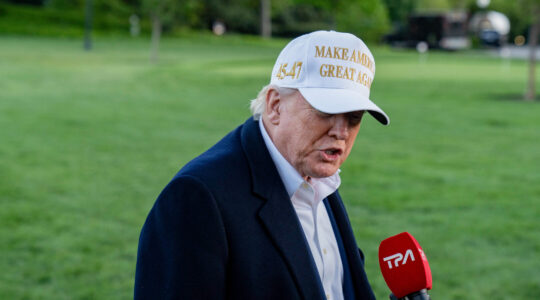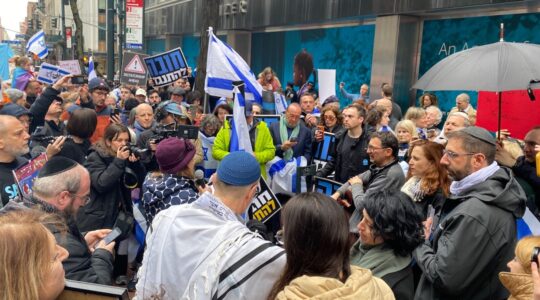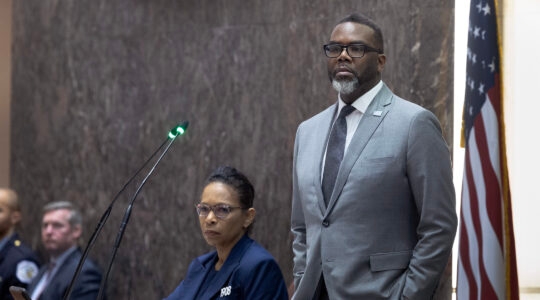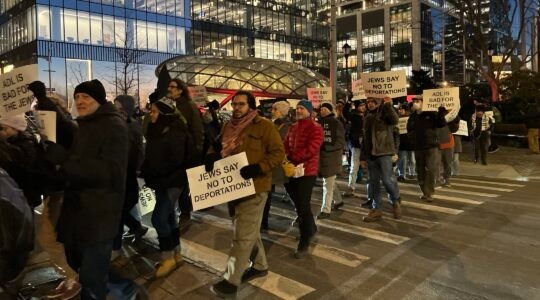
Protesters gathered in New York City on Sept. 22, 2008 to draw attention to the threat of Iran’s pursuit of nuclear weapons, the object of a joint statement by four Jewish movements. (Ben Harris)
WASHINGTON (JTA) — Synagogue movements from across the denominational spectrum are jointly calling on American Jews to "make Iran a matter of the highest priority.”
Organizations representing the Orthodox, Conservative, Reform and Reconstructionist movements made their pronouncement in a joint statement issued Sept. 4. The statement also outlines “Eight Actions to Stop a Nuclear Iran” — including posting signage at synagogues and bringing up the issue in interfaith dialogue — and urges the U.S. government to increase "economic and diplomatic pressure" against the Iranian regime.
Jewish communal leaders say the statement is part of an effort modeled on the Soviet Jewry campaign to build widespread awareness inside and outside the Jewish community of the threat posed by Iran.
It comes a few days before 350 Jewish leaders are scheduled to visit Washington on Sept. 10 for the National Jewish Leadership Advocacy Day on Iran. Participants are scheduled to meet with members of Congress and administration officials to discuss measures that can be taken to prevent Iran from developing nuclear weapons.
Signatories on the statement include congregational and rabbinical organizations affiliated with Reconstructionists (the Reconstructionist Jewish Reconstructionist Federation and the Reconstructionist Rabbinical Association), Reform (the Union for Reform Judaism and Central Conference of American Rabbis), Conservative (the Rabbinical Assembly and United Synagogue of Conservative Judaism), and Orthodox (the Orthodox Union, National Council of Young Israel and Rabbinical Council of America).
Bringing all four religious streams together on such a document “really demonstrates that on an issue of major substance and importance, we can speak with one voice,” said Rabbi Joel Meyers, the executive vice president emeritus of the Rabbinical Assembly, who coordinated the statement.
Meyers was working through the Inter-Agency Task Force on Iran, a group led by the Conference of Presidents of Major American Jewish Organizations, Jewish Council for Public Affairs, United Jewish Communities and NCSJ: Advocates on Behalf of Jews in Russia, Ukraine, the Baltic States & Eurasia.
Members of the task force agreed that a common statement on the Iran issue from the religious movements was necessary, Meyers said, adding that putting together the language was accomplished with little disagreement.
“There’s a concern” that this issue “gets lost with everything else going on” from other foreign policy hot spots to domestic issues such as health care and the economy, Meyers said. “We want to keep the issue of the danger of Iran in front of everybody.”
The statement stresses that the United States “must take the lead in increasing economic and diplomatic pressure on the Iranian regime at this time.” It expresses support for President Obama’s “diplomatic initiatives,” but also states that “for too long” the United States has “not taken action” and “not modeled forceful leadership to the rest of the world.”
Among the other eight suggested actions that individuals and Jewish institutions can take to “stop a nuclear Iran” are holding educational forums, contacting elected officials and writing letters to the editor to local publications.
Also on the list is a recommendation that synagogues and other institutions display signs on their property urging the prevention of a nuclear Iran, similar to signs that displayed the names of Soviet refuseniks in the 1970s and 1980s and, more recently, the Save Darfur signs at many shuls.
“We thought that would be helpful in keeping up an awareness level,” Meyers said.
The statement also urges rabbis and others who engage in interfaith dialogue to raise the issue with their partners.
Noting that much of the involvement in Iran activism until now has been concentrated at the leadership level of the community, Malcolm Hoenlein, executive vice-chairman of the Conference of Presidents, said that such action will make the issue more visible throughout both the Jewish and non-Jewish communities.
“We want to broaden the base of involvement,” Hoenlein said.
JTA has documented Jewish history in real-time for over a century. Keep our journalism strong by joining us in supporting independent, award-winning reporting.





